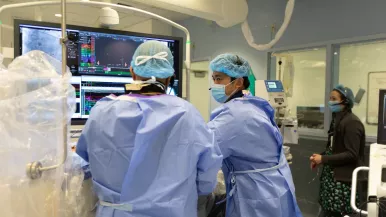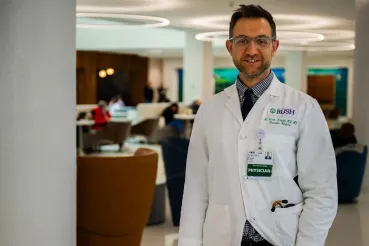If you’ve been referred to an electrophysiologist, you may be wondering what exactly these physicians do.
In short, an electrophysiologist is a cardiologist — a heart and vascular doctor — who specializes in the electrical system and rhythms of the heart.
Imagine that your heart is like a house. It has a structure, plumbing and electricity. The heart muscles and walls are its structure. The veins, arteries and blood flow are its plumbing. And the heartbeats and rhythms are its electrical system.
“If the heart were a house, then the electrophysiologist would be the electrician of the house,” says Erica Engelstein, MD, an electrophysiologist at Rush. “They're heart specialists with skills to manage heart rhythm problems."
So if you have an abnormal heartbeat, called arrhythmia, or a physician suspects you do, you may be referred to an electrophysiologist for care.
The basics of electrophysiology
When your heart beats irregularly, too rapidly or too slowly, it can cause big problems if it goes untreated. It can lead to issues like blood clots, stroke or heart failure.
An electrophysiologist can perform tests to diagnose the specific type of arrhythmia you have and create a plan to treat it.
One of the tests they do is called an electrophysiology study, also called an EP study.
During an EP study, you can expect the following:
- You’ll be sedated but awake.
- The electrophysiologist will place an IV in your femoral vein, which is in the groin.
- Then, they’ll run a catheter through the IV, up the vein and into your heart to find any abnormalities.
- It may sound unnerving, but the study is minimally invasive and safe, and it takes only an hour.
- When it’s over, you’ll likely go home the same day.
“An EP study is a special procedure to assess the electrical system of the heart and diagnose heart rhythm problems," Engelstein says. “We can take measurements of the electrical impulses and replicate abnormal heart beats to diagnose them.”
The electrophysiologist can also perform some procedures during the study to treat the arrhythmia if needed.
Another test electrophysiologists may use involves a device called a Holter monitor. It’s a battery-powered, portable electrocardiogram, often called an ECG or EKG. It connects to electrodes placed on your chest. You’ll wear the device throughout your normal day as it monitors your heart rhythms and collects data that the electrophysiologist can use to diagnose your condition.
One of the most common arrhythmias that electrophysiologists diagnose is atrial fibrillation, or AFib, which is a fast and irregular heart rhythm in the upper chambers of the heart.
But there are many other types of arrhythmias and heart conditions that electrophysiologists can diagnose and treat, including atrial flutter, ventricular tachycardia, supraventricular tachycardia and premature ventricular beats.

Electrophysiology procedures
Some arrhythmias are treated with lifelong medication and lifestyle changes. But many require electrophysiology procedures to manage or cure them.
There are several different procedures that electrophysiologists can perform, and some, like ablation, can be done during an EP study.
Ablation involves using heating or cooling energy to destroy tissue in the heart that is causing abnormal rhythms. The procedure can be performed again later if the arrhythmia returns.
“Once we diagnose an abnormal heartbeat with an EP study, we can often — in the same setting — fix the problem permanently, or at least long term, by delivering a small amount of energy to the area of abnormal electrical activity inside the heart,” Engelstein says. “The most common arrhythmia treated with ablation is AFib. We can also ablate supraventricular tachycardia, atrial flutters, and arrhythmias from the bottom chamber of the heart called ventricular tachycardia.”
Electrophysiologists can also implant devices that control irregular heart rhythms, like pacemakers and defibrillators.
- A pacemaker runs on battery power and delivers electrical impulses. It helps regulate the heartbeat, preventing it from getting too slow.
- A defibrillator can help treat conditions like ventricular tachycardia or ventricular fibrillation. It monitors the heart rate. If the heart rate is so fast that it could be life-threatening, it sends a powerful electrical shock, which brings the heart back into a normal rhythm.
There are many other procedures electrophysiologists can use. For example, they can perform left atrial appendage closure, which seals off part of the heart and prevents blood clots and possible stroke.
They can also perform lead extraction, a procedure to remove wires or “leads” from implanted devices that aren’t functioning properly or are causing problems.
And if needed, electrophysiologists can collaborate with cardiac surgeons and other specialists during procedures to treat other heart and vascular problems.
Advanced electrophysiology care
Electrophysiology care has been advancing over the years with newer, safer and more effective procedures and devices.
The following are a few of the advanced electrophysiology care options that are now available:
- Leadless pacemakers have no wires and are much smaller than standard pacemakers. They tend to lead to fewer complications, as well.
- Conduction system pacing is a technique that uses a pacemaker to stimulate the electrical system of the heart instead of the right ventricle. The conduction system is the highway in the heart that carries electrical signals. Stimulating this area instead of the ventricle reduces the risk of heart failure, AFib and mitral regurgitation.
- Pulsed field ablation, or PFA, is a catheter-based ablation procedure that, unlike traditional ablation, uses electrical impulses instead of heating or cooling energy to target tissue that causes abnormal heart rhythms.
New procedures and devices are being developed all the time. Health care institutions like Rush can give access to these advancements to patients through clinical trials.
“Rush is participating in over 30 research trials related to electrophysiology,” Engelstein says. “These include best strategies to manage stroke prevention in patients with AFib, assessing the most effective methods for ablation of ventricular tachycardia and assessing pacing strategies.”
If you’d like to learn more about electrophysiology and EP studies, you can visit our Electrophysiology Services page. And if you’re looking to make an appointment with an electrophysiologist, you can call Rush at (888) 352-7874.




